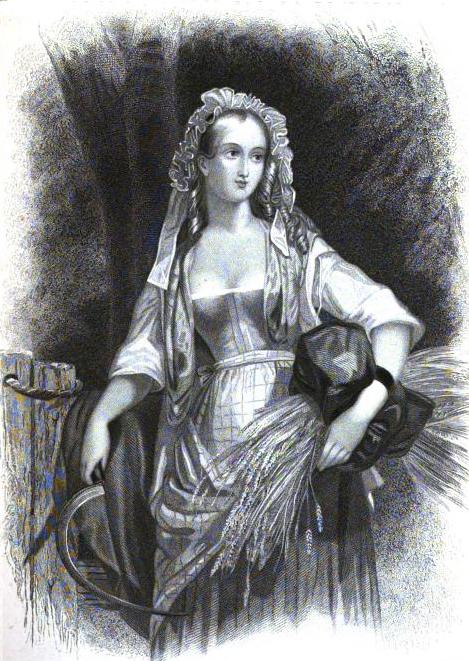Gleaning
September 28th, 2011
I could have sworn I already posted this illustration and poem, but it doesn’t seem to turn up in any of my site searches. Perhaps it was in the previous version of Circa 1850…before that unfortunate database crash in November 2010? Regardless, here it is again, from The Brilliant, a gift book for 1850, published by T(imothy) S(hay) Arthur, of Arthur’s Lady’s Magazine fame.

THE GLEANER.
Soft, and calm, and very still,
Fell the sunlight on the hill;
When the sultry noontide hour
Gave it most its strengh and power,
Like a glow of soft delight,
On a face with gladness bright;
Telling both of joy and rest,
Gentlest when the happiest.Even thus—as calm as fair,
Resting from the morning’s care,
Leaned, at noon, the dreaming maid,
Where the wood made deepest shade;
Calling back a dear delight,
Whispered to her over night,
‘Neath the boughs whose rustlings seem,
Mingled with her music-dream.May thy dreamings, maiden fair!
Ever such a glory wear—
Ever dwell a smile as meek
On thy yet unshadowed cheek.
Now thy life, like sunshine on,
Even when the dreams are gone;
And when golden youth is past,
Prove the loveliest at the last.
Gleaners were certainly romanticized in the 19th century. Take Tess Durbeyfield for example, who’s apparent innocence is highlighted by her work in the fields even as the presence of her doomed infant belies it. Or Philip Carey who finally takes Sally to his breast after watching her work at harvesting all day. And of course, there is Ruth, the biblical wife par excellence, who remains faithful to her mother-in-law even after she is widowed!
I have a plan to photography myself as a gleaner. Just as soon as I have time to make the costume, probably based on this illustration. I would also love to glean some day. But I have yet to meet anyone with a field of wheat, let alone one in which they would be willing to release me and my scythe.
